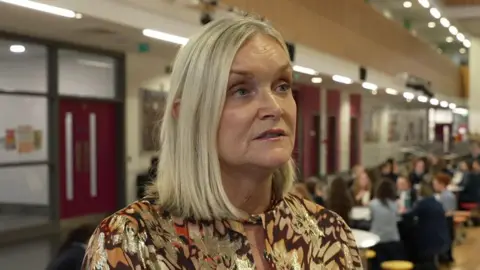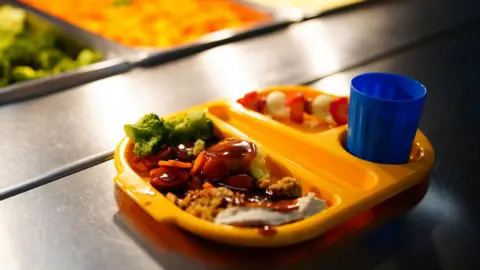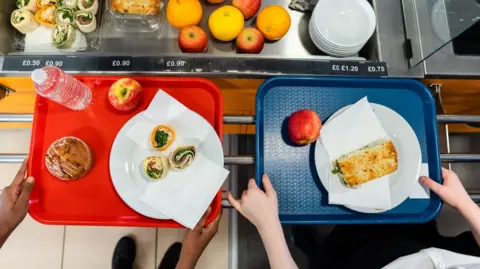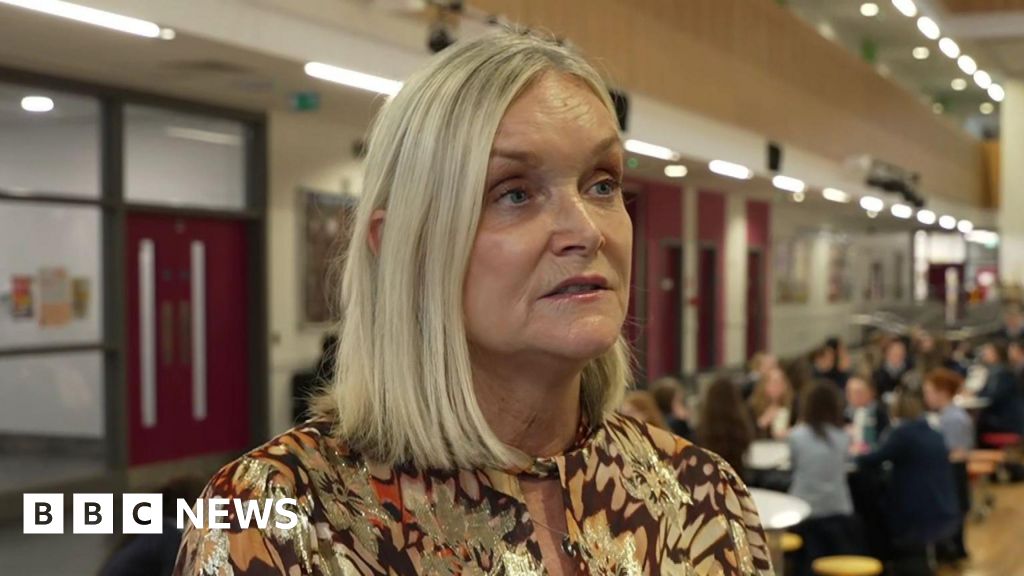Robbie MeredithEducation and arts correspondent, BBC News NI
 BBC
BBCA teacher has said an increase of the cost of school dinners by almost 20% will have a “significant impact on the majority of families” of pupils who attend the school.
Under savings plans announced by the Education Authority (EA), the cost of a school dinner for primary and special school pupils will go up by 50p from £2.50 to £3.00.
Post-primary pupils face price rises of 19% on food they buy from school cafeterias, while pre-school prices will also go up.
Tracy Rossborough, a senior teacher at Ashfield Girls’ High School in Belfast, said they are concerned that families won’t be able to afford the price increase.
Pupils on free school meals will not be affected by the price rises, which take effect from January 2026.
 PA Media
PA Media“We have maybe have three or four children from the same family so that is quite a significant hike across the week and month,” Ms Rosborough told BBC News NI.
“For some of our young people this would be the main meal of the day,” she said adding that made it even more of a concern.
She said that the choices available to those in the canteen allow pupils to make healthy choices and “if that choice is taken away from our young people and from the families that would be really concerning to us”.
Around 210,000 school meals are eaten every day, although around 90,000 pupils are entitled to free school meals.
The EA said that the cost of a school dinner had not risen since 2017/18 while inflation had increased by around 35% in that time.
They said that each school meal costs an average of £4.28 to produce.
The EA has said it is facing a funding gap of £300m and, unlike in previous years, does not expect additional in-year money to address the shortfall.
The authority had previously told school principals to restrict the appointment of new staff and limit the use of substitute teachers to save money.
But the new savings measures will directly affect families and some of the things they pay for at school.
Making savings
 Getty Images
Getty ImagesThe rise in school meal prices is not the only savings measure the EA is introducing.
Pupils who receive music tuition from the EA Music Service also face paying more for it, though the exact charges have not yet been detailed.
“The Music Service is a non-statutory service, meaning it is one of the limited areas where there is discretion to make savings without legislative or policy change,” the EA said in a statement.
“Increasing income from charging is the most feasible way to offset the cost of delivering this service and to secure savings in-year.”
Children entitled to free school meals who currently receive free music lessons and instrument hire also face being charged, though they will still receive a significant discount of 70% on their fees.
Almost 13,000 pupils were registered with the EA music service in 2024/25, including 1,400 entitled to free school meals.
‘Unsustainable budgetary shortfalls’
The EA will also try to cut the money it spends on school transport.
The authority described the increasing cost of taxis as “of significant concern”.
The EA said that the total annual bill for taxi use had more than doubled in five years – growing from just under £20m in 2020/2021 to almost £40m in 2024/2025.
The EA also said it would end some agency contracts and reduce overtime payments across its own workforce.
“Education services in NI have faced growing and increasingly unsustainable budgetary shortfalls for a number of years,” the EA said in a statement.
“Living within allocated funding – whilst meeting rising service needs – has been an increasing challenge.”
“The Education Authority has therefore regrettably been required to identify a series of significant savings measures.”
The authority hopes to make up to £30m in savings from the measures it has announced, but said that the EA board had not supported other undisclosed savings measures due to the scale of their potential impact.
Further savings may require law or policy changes from MLAs.
Separately, Stormont’s Public Accounts Committee (PAC) recently reported that many schools in Northern Ireland “are in a state of disrepair,” and it would take up to £800m to fix them.


